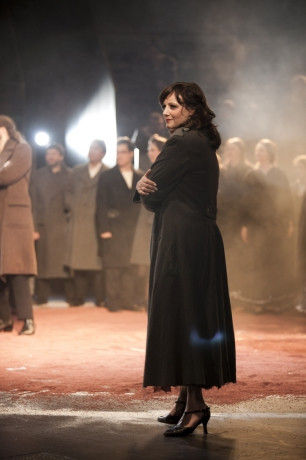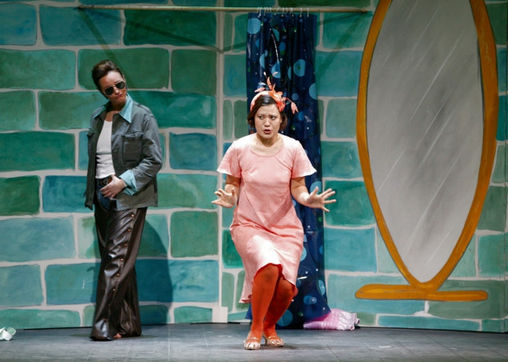
.jpeg)

.jpeg)

.jpeg)

.jpeg)

.jpeg)

The German-Italian mezzo-soprano Julia Rutigliano has made a name for herself particularly in the Wagner field. She made her debut at the Bayreuth Festival in The Ring of Nieblungen under the conducter Kirill Petrenko and director Frank Castorf, in the role of Wellgunde in Rheingold and Götterdämmerung and as Siegrune in Die Walküre. This was followed by engagements as Wellgunde under Marek Janowski at the Elbphilharmonie in Hamburg, the Festspielhaus in Baden-Baden and the Konzerthaus Dortmund, as well as numerous appearances as Siegrune, with which she performed at the Semperoper Dresden under Christian Thielemann, at the Concertgebouw Amsterdam under Valery Gergiev, at the Staatsoper Unter der Linden under Daniel Barenboim, at the Maggio Musicale in Florence and at the Palau des les Arts in Valencia, both under Zubin Mehta, and at the Bastille in Paris under Philipp Jordan. In the coming year, Siegrune will again take her to the Semperoper in Dresden under Thielemann and, for the first time, to the Teatro San Carlo in Naples under Dan Ettinger. Before that, however, this autumn she will preform as a drummer in V. Ullmann’s Der Kaiser von Atlantis under Omer Meir Wellber at the Teatro Massimo in Palermo. Other Wagner parties such as Venus in Tannhäuser and Brangäne in Tristan und Isolde have long been part of her repertoire. She made her debut with Venus in Bremen in 2011 under Markus Poschner (musical direction) and Tobias scratches (director) and recently celebrated another great success at the Mecklenburg State Theater under Mark Rohde (musical director) and Martin G. Berger (director). In 2014 she sang the role of Brangäne under Zubin Mehta at the Maggio Musicale in Florence. Another central point in the artist’s work are roles such as Carmen, with which she celebrated great success among other theaters at the Teatr Wielki Opera Narodowa in Warsaw. Her repertoire also includes Roles such as Charlotte from Massenet’s Werther, Octavian from Strauss’ Der Rosenkavalier, Suzuki from Puccini’s Madama Butterfly, Leonor from Donizetti La Favorite and Mutter from Humperdinck’s Hänsel und Gretel. In the concert field she sang regularly in concerts under Zubin Metha, for example in Mahler’s 2nd Symphony and Mozart’s Coronation Mass with the Israel Philharmonic, with Bruckner’s Te Deum with the Symphonieorchester des Bayerischen Rundfunks and Beethoven’s 9th Symphony at the Teatro Maggio Musicale in Florence. She is particularly fond of romantic works such as Verdi’s Requiem, Dvořák’s Stabat Mater, Rossini’s Petite Messe Solennelle and Berlioz’ Les nuit d’été, to name but a few. The mezzo-soprano began her musical career in the girls’ choir in Würzburg, with whom she appeared on stage as a child in operas such as Johanna auf dem Pyreheap by A. Honegger, The Cunning Little Vixen by L. Janacek and Jakob Lenz by W. Rihm. As a young girl she already studied at the Würzburg high school for music, and later on at the Hochschule für musik in Munich. She graduated with honors and continued her career in the opera studio at the Staatstheater Nürnberg. From 2009-2012 she was a permanent member of the ensemble at the Staatstheater Braunschweig, where she performed roles such as Carmen, Suzuki, Mary, Hermia, Olga, Orlowsky, Donna Elvira, Aksinja and Orpheus.Directors love the versatile singer for her love of acting, just like conductors for her musicality and reliability. The press describes Julia Rutigliano as “an outstanding Venus with vibrant vocal drama and considerable performance potential” (Venus), “vocally and theatrically so accurate, so precise that the others next to her look a little gray despite all the singing brilliance..”(Charlotte ), “emotional fixed star of the evening” (Charlotte) and recently “a mezzo with vigor and powerful ?” (Venus) She is a member of the board of directors of the Bühnenmütter e.V. for more family-friendly working conditions in German theaters.In 2014 she was awarded the Culture Prize of the City of Würzburg.

The German-Italian mezzo-soprano Julia Rutigliano has made a name for herself particularly in the Wagner field. She made her debut at the Bayreuth Festival in The Ring of Nieblungen under the conducter Kirill Petrenko and director Frank Castorf, in the role of Wellgunde in Rheingold and Götterdämmerung and as Siegrune in Die Walküre. This was followed by engagements as Wellgunde under Marek Janowski at the Elbphilharmonie in Hamburg, the Festspielhaus in Baden-Baden and the Konzerthaus Dortmund, as well as numerous appearances as Siegrune, with which she performed at the Semperoper Dresden under Christian Thielemann, at the Concertgebouw Amsterdam under Valery Gergiev, at the Staatsoper Unter der Linden under Daniel Barenboim, at the Maggio Musicale in Florence and at the Palau des les Arts in Valencia, both under Zubin Mehta, and at the Bastille in Paris under Philipp Jordan. In the coming year, Siegrune will again take her to the Semperoper in Dresden under Thielemann and, for the first time, to the Teatro San Carlo in Naples under Dan Ettinger. Before that, however, this autumn she will preform as a drummer in V. Ullmann’s Der Kaiser von Atlantis under Omer Meir Wellber at the Teatro Massimo in Palermo. Other Wagner parties such as Venus in Tannhäuser and Brangäne in Tristan und Isolde have long been part of her repertoire. She made her debut with Venus in Bremen in 2011 under Markus Poschner (musical direction) and Tobias scratches (director) and recently celebrated another great success at the Mecklenburg State Theater under Mark Rohde (musical director) and Martin G. Berger (director). In 2014 she sang the role of Brangäne under Zubin Mehta at the Maggio Musicale in Florence. Another central point in the artist’s work are roles such as Carmen, with which she celebrated great success among other theaters at the Teatr Wielki Opera Narodowa in Warsaw. Her repertoire also includes Roles such as Charlotte from Massenet’s Werther, Octavian from Strauss’ Der Rosenkavalier, Suzuki from Puccini’s Madama Butterfly, Leonor from Donizetti La Favorite and Mutter from Humperdinck’s Hänsel und Gretel. In the concert field she sang regularly in concerts under Zubin Metha, for example in Mahler’s 2nd Symphony and Mozart’s Coronation Mass with the Israel Philharmonic, with Bruckner’s Te Deum with the Symphonieorchester des Bayerischen Rundfunks and Beethoven’s 9th Symphony at the Teatro Maggio Musicale in Florence. She is particularly fond of romantic works such as Verdi’s Requiem, Dvořák’s Stabat Mater, Rossini’s Petite Messe Solennelle and Berlioz’ Les nuit d’été, to name but a few. The mezzo-soprano began her musical career in the girls’ choir in Würzburg, with whom she appeared on stage as a child in operas such as Johanna auf dem Pyreheap by A. Honegger, The Cunning Little Vixen by L. Janacek and Jakob Lenz by W. Rihm. As a young girl she already studied at the Würzburg high school for music, and later on at the Hochschule für musik in Munich. She graduated with honors and continued her career in the opera studio at the Staatstheater Nürnberg. From 2009-2012 she was a permanent member of the ensemble at the Staatstheater Braunschweig, where she performed roles such as Carmen, Suzuki, Mary, Hermia, Olga, Orlowsky, Donna Elvira, Aksinja and Orpheus.Directors love the versatile singer for her love of acting, just like conductors for her musicality and reliability. The press describes Julia Rutigliano as “an outstanding Venus with vibrant vocal drama and considerable performance potential” (Venus), “vocally and theatrically so accurate, so precise that the others next to her look a little gray despite all the singing brilliance..”(Charlotte ), “emotional fixed star of the evening” (Charlotte) and recently “a mezzo with vigor and powerful ?” (Venus) She is a member of the board of directors of the Bühnenmütter e.V. for more family-friendly working conditions in German theaters.In 2014 she was awarded the Culture Prize of the City of Würzburg.
























